

The Satori Generation. Traducción Español They don’t want cars or brand name handbags or luxury boots.
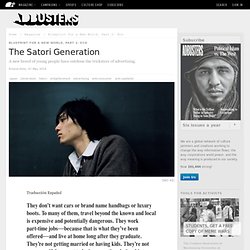
To many of them, travel beyond the known and local is expensive and potentially dangerous. They work part-time jobs—because that is what they’ve been offered—and live at home long after they graduate. They’re not getting married or having kids. History of Whole Earth Catalog. The WHOLE EARTH CATALOG was published regularly from 1968 to 1972, but only intermittently thereafter.

During its four years of regular publication, the Catalog earned a reputation, a following, and a National Book Award, the only time a catalog has been so honored. Standing with one foot firmly in the rugged individualism and back-to-the-land movements of the Sixties counterculture and the other in the nascent global community made possible by the Internet, the WHOLE EARTH CATALOG offered an integrated, complex, challenging, thought-provoking, and comprehensive worldview. Founder Stewart Brand, in his 1968 CATALOG article, "We are as gods" said, "At a time when the New Left was calling for grass-roots political (i.e., referred) power, Whole Earth eschewed politics and pushed grassroots direct power—tools and skills. The Ortega Park Teachers Laboratory. Full text of "Synergy" BookScouter.com - Sell Textbooks. List of Possessions. List of Possessions Last updated 17apr2013 Current count: 89 items Non-consumables (term courtesy of 4-plates.com) i.e. mostly not including toiletries or kitchenware.
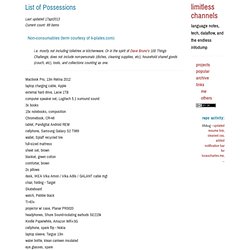
Naked in the flat. Could you live without any belongings?
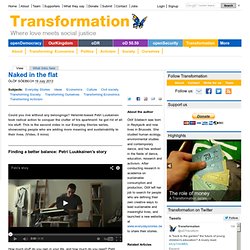
Helsinki-based Petri Luukainen took radical action to conquer the clutter of his apartment: he got rid of all his stuff. This is the second video in our Everyday Stories series, showcasing people who are adding more meaning and sustainability to their lives. Tiny House. The Tiny Life: How to Build Your Home, Stay Online, and See the World for $250 a Month. In 2009, Netaro, a Japanese philosophy student, built a tiny solar-powered house with his bare hands for $1,000.

Then he whipped together an even tinier solar-powered mobile-house for $130. He then set about carting the little domicile around the country, dragging it behind his motorcycle at 15 miles per hour. Eulogy of stuff. Story of Stuff. The Story of Stuff, originally released in December 2007, is a 20-minute, fast-paced, fact-filled look at the underside of our production and consumption patterns.
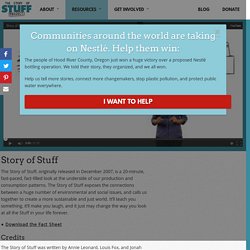
The Story of Stuff exposes the connections between a huge number of environmental and social issues, and calls us together to create a more sustainable and just world. It’ll teach you something, it’ll make you laugh, and it just may change the way you look at all the Stuff in your life forever. Download the Fact Sheet Credits. :mnmlist. The Top 6 Causes of Clutter. » Decluttering as Zen Meditation. Post written by Leo Babauta.
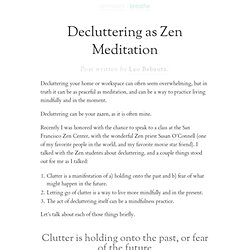
Decluttering your home or workspace can often seem overwhelming, but in truth it can be as peaceful as meditation, and can be a way to practice living mindfully and in the moment. Decluttering can be your zazen, as it is often mine. Recently I was honored with the chance to speak to a class at the San Francisco Zen Center, with the wonderful Zen priest Susan O’Connell (one of my favorite people in the world, and my favorite movie star friend). I talked with the Zen students about decluttering, and a couple things stood out for me as I talked: Clutter is a manifestation of a) holding onto the past and b) fear of what might happen in the future.Letting go of clutter is a way to live more mindfully and in the present.The act of decluttering itself can be a mindfulness practice.
Let’s talk about each of those things briefly. The Case for Filth. Buddha's Brain: Neuroplasticity and Meditation. Living With Less. A Lot Less. I have come a long way from the life I had in the late ’90s, when, flush with cash from an Internet start-up sale, I had a giant house crammed with stuff — electronics and cars and appliances and gadgets.
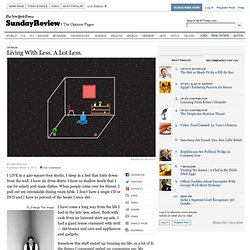
Somehow this stuff ended up running my life, or a lot of it; the things I consumed ended up consuming me. My circumstances are unusual (not everyone gets an Internet windfall before turning 30), but my relationship with material things isn’t. We live in a world of surfeit stuff, of big-box stores and 24-hour online shopping opportunities.
Members of every socioeconomic bracket can and do deluge themselves with products. There isn’t any indication that any of these things makes anyone any happier; in fact it seems the reverse may be true. The Black T-Shirt Video : Hitchcock Partners, New York City based brand growth advisors. Adbusters’ War Against Too Much of Everything. Why Pay More? by Peter Singer. Exit from comment view mode.
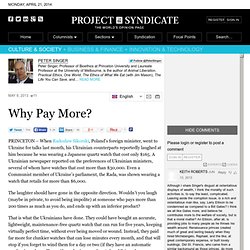
Click to hide this space PRINCETON – When Radosław Sikorski, Poland’s foreign minister, went to Ukraine for talks last month, his Ukrainian counterparts reportedly laughed at him because he was wearing a Japanese quartz watch that cost only $165. A Ukrainian newspaper reported on the preferences of Ukrainian ministers, several of whom have watches that cost more than $30,000. How to get along for 500 days alone together. Calvin and Hobbes on Stuff January 31, 1993 on GoComics. iDont Need Any of This Shit w logos. And things never really satisfy... Veronica in Archie comic. The Clutter Culture - Feature - UCLA Magazine Online. By Jack Feuer Published Jul 1, 2012 8:00 AM "For more than 40,000 years," write the authors, "intellectually modern humans have peopled the planet, but never before has any society accumulated so many personal possessions.
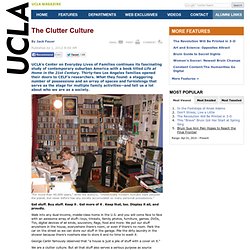
" Get stuff. Buy stuff. Keep it . The Psychology of Consumerism. This is a guest post from David M. Carter, a graduate of the master of applied positive psychology program at the University of Pennsylvania, and the first graduate of the program to emphasize the inherent link between increased well-being and sustainable consumption.
A recent story in my local newspaper dealt with a sad-case family. How America's 'Culture of Hustling' Is Dark and Empty - David Masciotra. A Rich Life without Money. Tips, Blogs, Stories, Books.